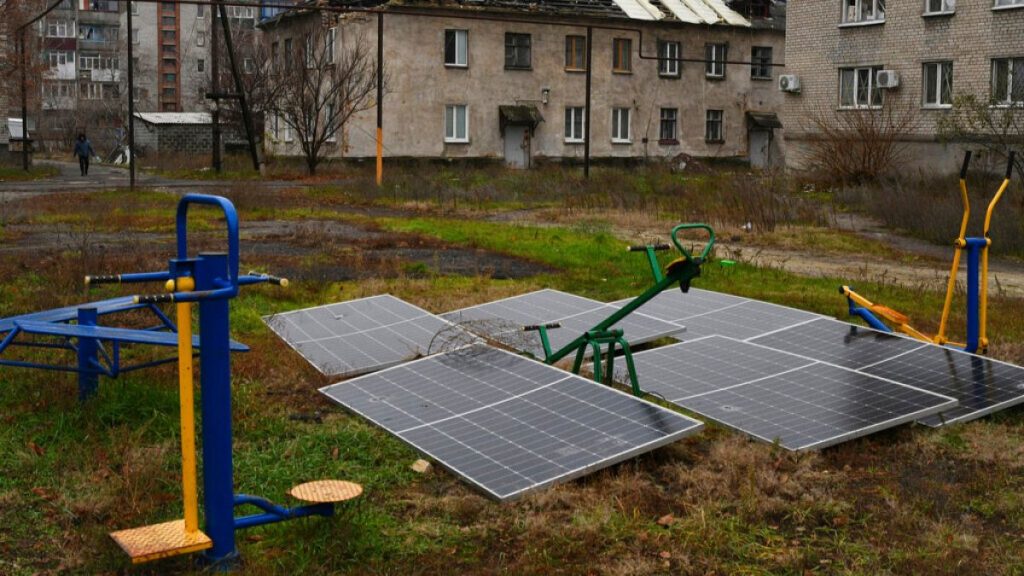Ukrainian homeowners are looking to alternative energy sources such as photovoltaics to protect themselves from power blackouts caused by Russian attacks on the country’s energy infrastructure. Since the 2022 invasion, over 50% of Ukraine’s energy infrastructure has been destroyed, leading many residents to seek out solutions to ensure they have access to electricity during the harsh winter months. By connecting to rooftop solar systems, residents can store electricity using power converters and batteries, allowing them to rely on solar energy even during periods of limited sunlight. Ihor Kondenko, a resident of an apartment complex in Kyiv, uses solar energy daily and relies on storage batteries for electricity after sunset.
The Energy Efficiency Fund (EEF) in Ukraine, established five years ago to support the country’s green transition, has played a key role in helping homeowners like Kondenko connect to the clean energy grid. The agency provides grants to improve energy efficiency and covers up to 70% of the costs associated with financing equipment. However, due to the ongoing war with Russia, the EEF has shifted its focus to assisting people in getting through a challenging winter in their homes. Dmytro Syrykh, the Technical Director of EEF, emphasized the importance of supporting the green revolution and promoting energy production from clean sources as part of their program’s goals amidst the current crisis.
With the destruction of much of Ukraine’s energy infrastructure by Russian attacks, the reliance on alternative energy sources such as solar power has become crucial for many residents. By harnessing the sun’s rays through photovoltaic systems, homeowners can ensure a more reliable source of electricity during times when traditional power sources may be compromised. The use of power converters and batteries allows residents to store excess solar energy for use during periods of limited sunlight, providing a degree of energy independence and resilience in the face of potential power outages.
For residents like Ihor Kondenko, the decision to switch to solar energy has proven to be a wise investment, allowing him to rely on clean and sustainable power even in the midst of a challenging winter season. By leveraging the resources provided by the Energy Efficiency Fund and other programs supporting clean energy initiatives, homeowners in Ukraine are able to not only safeguard themselves against power blackouts but also contribute to the country’s broader goals of transitioning towards a greener and more sustainable energy future. Despite the challenges posed by the ongoing conflict with Russia, the adoption of solar power and other renewable energy sources offers a ray of hope for Ukrainian residents seeking to weather the storm and emerge stronger on the other side.
As Ukraine grapples with the devastating impact of Russian attacks on its energy infrastructure, the shift towards solar power and other renewable energy sources represents a resilient response to the crisis. By investing in rooftop solar systems and storage solutions, residents are able to mitigate the risk of power outages and ensure a more reliable source of electricity during challenging times. Programs like the Energy Efficiency Fund, though originally designed to support energy efficiency initiatives, are now focused on helping homeowners navigate a difficult winter season and maintain access to essential services through the use of clean energy technologies.
In the face of ongoing conflict and uncertainty, the choice to embrace solar power and other sustainable energy solutions reflects a commitment to resilience and self-sufficiency among Ukrainian homeowners. By tapping into the abundant energy resources provided by the sun, residents like Ihor Kondenko are able to reduce their reliance on traditional power sources and ensure a more stable energy supply for themselves and their families. As Ukraine continues to rebuild and recover from the devastation caused by Russian attacks, the adoption of clean energy technologies offers a path towards a more sustainable, secure, and independent future for the country and its people.


